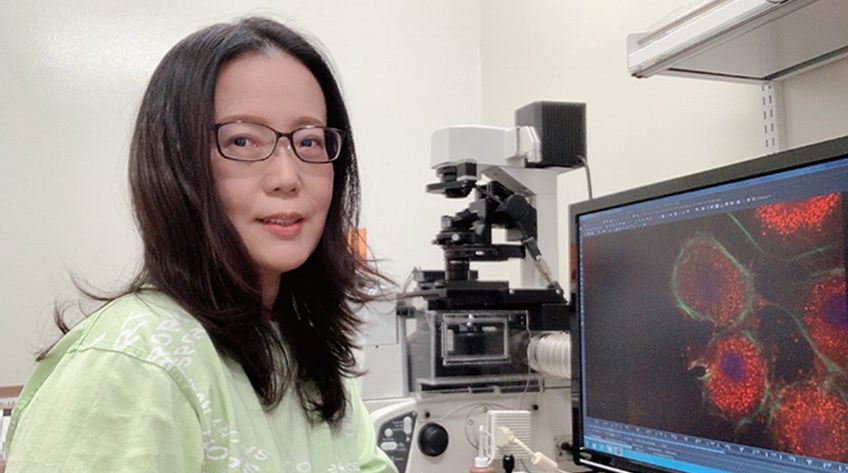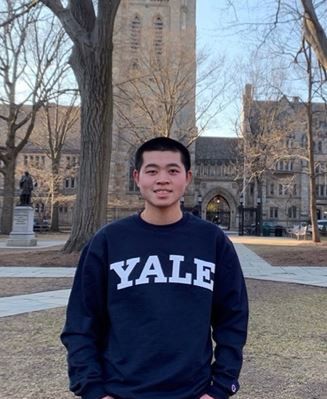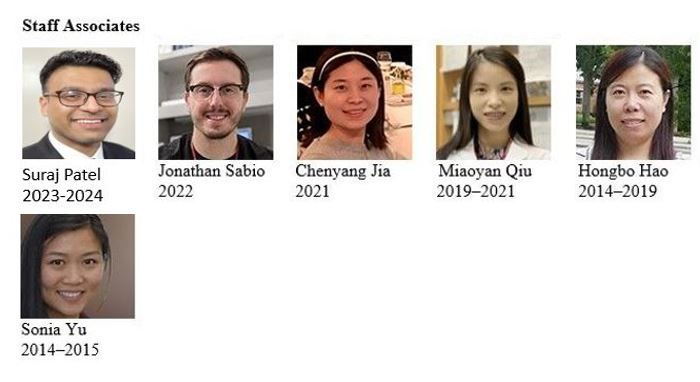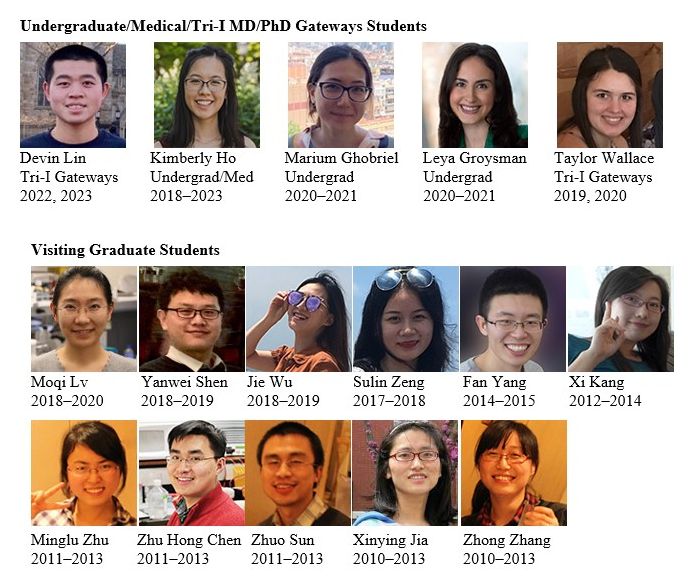We study the genetic, epigenetic, and metabolic mechanisms of cancer evolution, based on which we develop personalized tumor models to advance precision cancer treatment. Specifically, our research focuses on PTEN, one of the most frequently mutated genes in human cancer, and we have pioneered the discovery of “nuclear PTEN” and revelation of its association with the chromosome in maintaining genomic integrity (Cell 2007). We mapped the essential domain of PTEN for anchoring chromosomes, created a mouse model, and identified a driver mutation for tumor development (Cell Rep 2014.1). Using this model, we defined a non-canonical PTEN epigenetic pathway that controls chromatin architecture and the transcriptome (Cell Rep 2014.2). Our research demonstrated that PTEN controls multiple genetic transmission processes, including DNA replication (Nat Commun 2015), DNA decatenation (Sci Rep 2015), chromosome segregation (Nat Commun 2016), and cell division (Cell Cycle 2016). In addition, we discovered the first PTEN isoform, PTENα, and demonstrated its functional interaction with canonical PTEN in regulating mitochondrial bioenergetics (Cell Metab 2014). Based on these findings, we generated additional PTEN mutant knock-in models in a conditional setting. These unique models enable mapping genetic alterations to tumor phenotypes and dissecting the PTEN function in mediating tumor-immune crosstalk. The overarching goal of our study is to identify actionable targets for cancer treatment, tailored to the genetic, epigenetic, metabolic, and immune signature of each tumor.
MEMBERS

Wen H. Shen, Ph.D.
Principal Investigator
Trained in Physiology and Immunology, Wen H. Shen obtained her Ph.D. from the University of Illinois at Urbana-Champaign. Her postdoctoral study at Columbia University led her research to the field of cell biology and genetics with a focus on tumor suppressor genes. While PTEN was known as a cytoplasmic protein that antagonizes PI3 kinase, her work uncovered “nuclear PTEN” and revealed its function in maintaining chromosome integrity. Since then, PTEN has entered “the nuclear age” and been recognized as a “guardian of the genome”. Her continued effort in scrutinizing the nuclear function of PTEN resulted in a number of findings that significantly expanded the PTEN tumor suppressive network. She is interested in collaborating with cancer biologists, immunologists and oncologists to implement translational studies to facilitate the effectiveness of anti-cancer therapies. Dr. Shen is a member of the Sandra and Edward Meyer Cancer Center and is also affiliated with the Tri-Institutional MD-PhD training program (centered among three institutions: Weill Cornell Medicine, the Rockefeller University, and Sloan Kettering Cancer Center) and the New York Genome Center.

Jinghua Zhong, Ph.D.
Visiting Fellow
Dr. Zhong has been engaged in the clinical comprehensive diagnosis and treatment of head and neck tumors (nasopharyngeal cancer, laryngeal cancer), lymphoma, soft tissue tumors and melanoma for more than 10 years. His research focuses on the regulatory role of non-coding RNA in invasion and metastasis of nasopharyngeal carcinoma, identification and clinical application of molecular markers of malignant tumor, and mechanism of tumor radiation damage. He received his Doctor of Medicine degree from Southern Medical University in 2013. He has studied in the Cancer Prevention and Control Center of Sun Yat-sen University, Lincoln Memorial University School of Medicine (LMU) in the United States, and the National Cancer Center of Naples (IRRCS) in Italy. Dr. Zhong joins Dr. Shen’s Lab as a Visiting Fellow in Radiation Oncology, where he will be studying radiation-induced tumor-immune interaction and related mechanisms.

Raymond Briones
Research Technician
Raymond Briones graduated from the Grove School of Engineering at the City College of New York and received his B.E. in Biomedical Engineering. Raymond previously worked with microfluidic devices and how they can be used as a clinical platform to rapidly identify precise and effective therapies for individual cancer patients. Raymond is especially interested in cancer research and personalized medicine to help enhance patient's quality of life. At the Shen Lab, he is responsible for harvesting and culturing organoids from patient tumor samples to develop personalized tumor models in advancing personalized cancer treatment. During his free time, Raymond enjoys trying out new cuisines, traveling, playing sports, and attending concerts.

Devin Lin
Research Technician
Devin graduated this year from Yale with a major in Molecular, Cellular, and Developmental Biology. Before Yale, Devin has lived in North Carolina his entire life, working at his family restaurant as a waiter, cashier and eventually manager. For some, he’s a familiar face as Devin has participated in the Tri-Institutional MD-PhD Gateways program over the past two summers. He’s returning this year as a research technician in the Shen lab while preparing for a PhD application in Cellular Biology. During his free time, Devin enjoys playing chess, fishing, hiking, table tennis, and interestingly enough, poker.

Eve Sullivan
Undergraduate Researcher
Eve Sullivan is currently an undergraduate studying biology and math in the honors program at New York University. She first became involved with the Shen Lab doing remote data analysis as a high school student. She officially joined the lab in January 2022 after beginning college. Eve has previously researched cancer cell migration at NYU, and she looks forward to applying this knowledge in addition to learning new theories and techniques at the Shen Lab. In her free time, Eve enjoys reading and listening to music, and can often be found playing piano in a practice room somewhere on campus.

Amritpaul Multani
Pre-Med Research Intern
Amritpaul has recently graduated Magna Cum Laude at CUNY Hunter College with a B.A. in Biological Sciences. He is currently preparing to apply for medical school in 2024 and hoping to matriculate in the following year. Amritpaul is interested in how the epigenetic profile in tumor cells can influence the tumor microenvironment and how genetic alterations influence the morphology of tumor cells. In his free time, Amritpaul enjoys weightlifting and playing basketball competitively, listening to Hip Hop and Indie music, as well as quality time with his family and cousins.

Benny Bergman
High School Intern
Benny is a student at Packer Collegiate Institute. He has an interest in biology and in studying cancer. He loves music, animals, and quality time with his family.
FORMER LAB MEMBERS




RECENT REVIEWS for better understanding our research and related studies
- Fan, X., Kraynak, J., Knisely, J.P.S., Formenti, S.C. & Shen, W.H. (2019) PTEN as a guardian of the genome: pathways and targets. Cold Spring Harbor Perspectives in Medicine. pii: a036194. doi: 10.1101/cshperspect.a036194.
- Hou, S.Q., Ouyang, M., Brandmaier A., Hao, H., & Shen, W.H. (2017) PTEN in the maintenance of genome integrity: from DNA replication to chromosome segregation. BioEssays. 39(10). doi: 10.1002/bies.201700082.
- Brandmaier A., Hou, S.Q., & Shen, W.H. (2017) Cell cycle control by PTEN. Journal of Molecular Biology. Jul 21;429(15):2265-2277. doi: 10.1016/j.jmb.2017.06.004.
- Brandmaier A., Hou, S.Q., Demaria S., Formenti, S.C., & Shen, W.H.(2017) PTEN at the interface of immune tolerance and tumor suppression. Frontiers in Biology. 12(3):163-174. doi: 10.1007/s11515-017-1443-5.
For a complete list of peer-reviewed publications from Wen H. Shen, please visit here.

